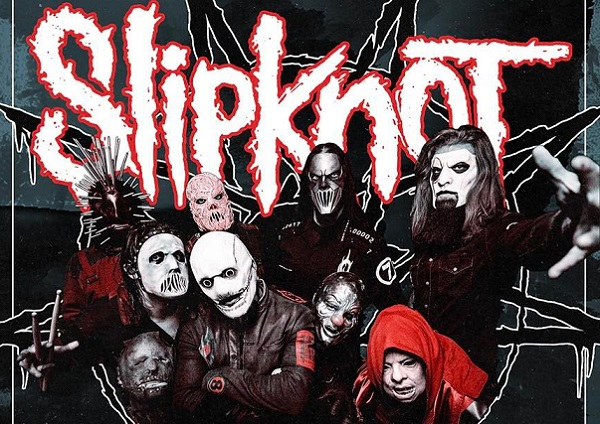Slipknot, the nine-piece masked metal machine from Des Moines, Iowa, has been a phenomenon since the late ’90s. Their visceral intensity, chaotic live shows, and a relentless barrage of sonic fury have propelled them to the upper echelons of metal stardom.
RELATED: Arian Foster: Biography, NFL Career & Net Worth
RELATED: Eric Barone Net Worth: The Inspiring Story of the Stardew Valley Creator
This guide delves into the band’s history, their unique brand of aggression, and why they’ve become synonymous with the very essence of modern heavy metal.
Table of Contents
The Rise of the Maggots
Slipknot’s origins trace back to 1995, born from the creative chaos and dissatisfaction of founding members Shawn “Clown” Crahan (percussion), Joey Jordison (drums), and Paul Gray (bass). The band’s relentless experimentation with lineups, sounds, and concepts would cement their unpredictable nature.
It wasn’t until 1999, with the release of their iconic self-titled debut, that Slipknot introduced the world to their nine masked entities and the devoted fanbase they called “Maggots”.
The Mask and the Music
One of Slipknot’s defining features is their masks. Evolving with each album, these masks reflect both individuality and the collective horror show that is Slipknot. They are not just gimmicks but representations of the members’ inner demons and the raw energy they unleash.
Musically, Slipknot is a relentless assault on the senses. Their signature sound blends nu-metal’s groove with the brutality of death metal, thrash metal’s energy, and even elements of industrial and hip-hop.
RELATED: Hassan Jameel: The Saudi Businessman and Philanthropist
RELATED: Phil Murphy Net Worth: Biography, Policies & Legacy as New Jersey Governor
Their layered percussion, comprised of custom drums and kegs, creates a tribalistic wall of sound, while DJ Sid Wilson adds scratching and samples for an unsettling atmosphere. Vocalist Corey Taylor’s range is astounding, from guttural roars to melodic screams, delivering lyrics about darkness, anger, and alienation.
The Evolution
While always firmly rooted in aggression, Slipknot refuses to stagnate. Albums like “Iowa” (2001) amplified their sheer brutality, while “Vol. 3 (The Subliminal Verses)” (2004) showed a glimpse of melody. Subsequent releases continued their experimentation, making each album feel like an impactful event.
Even with the tragic loss of Paul Gray in 2010 and the departure of Joey Jordison in 2013, Slipknot persevered, showing their unwavering resilience. New members, masked and mysterious, have filled the void, and the band’s musical evolution continues with recent albums “.5: The Gray Chapter” (2014) and “We Are Not Your Kind” (2019).
Live Mayhem
Slipknot isn’t just about the music; their concerts are legendary experiences. Imagine a stage transformed into a nightmarish circus, complete with pyrotechnics, hydraulic platforms, and band members scaling dangerous heights. The crowd itself becomes part of the spectacle, moshing, headbanging and singing along in a cathartic release of collective energy.
Legacy and Influence
Slipknot’s impact on heavy music is undeniable. They’ve been a gateway band for many, drawing people into metal’s heavier realm. Their commercial success paved the way for other masked or theatrical metal acts and proved that aggression and experimentation could thrive in the mainstream.
The Maggot Mentality
Beyond the music and theatrics, Slipknot has fostered a powerful sense of community with their fans. The Maggots are fiercely loyal, a tribe of outsiders finding solace and belonging in the band’s message. Slipknot’s music offers an outlet for rage, frustration, and the darker sides of human emotion – a space to embrace those feelings without judgment.
Why do Slipknot wear masks?
In the late nineties, while in their early stages in Iowa, Slipknot’s percussionist Shaun ‘Clown’ Crahan introduced the idea of wearing masks by showing up to rehearsals donning a clown mask, earning him the nickname ‘Clown.’ In 1997, the band collectively decided that each member should adopt a distinctive mask, complemented by a trademark jumpsuit.
What made Slipknot so popular?
Renowned for their captivating image, intense musical style, and dynamic and tumultuous live performances, Slipknot originated in Des Moines, Iowa, U.S. The band swiftly gained widespread recognition after the launch of their self-titled debut album in 1999.
Is Slipknot a death metal band?
No, they’re not a death metal band
Arguably, Slipknot’s most significant accomplishment lies in introducing a multitude of previously unexposed fans to the realm of extreme metal through their music. While not classified as a death metal band, Slipknot brought a level of brutality to the mainstream with Iowa.
RELATED: The Pluto Pillow: Your Key to Personalized Sleep Perfection
RELATED: Grandmaster Flash – Bajan DJ: Hip Hop Pioneer and Legend
In Conclusion
Slipknot is more than a band; they are a force of nature. Their commitment to unbridled expression, their visual shock factor, and their relentless musical evolution have earned them their status as metal icons. Whether you’re a die-hard Maggot or a curious newcomer, the masked metal legends from Iowa demand your attention.
FAQs
1. Why does Slipknot wear masks?
- The masks embody their raw emotions, individual personalities within the band, and a sense of mystery. The masks constantly evolve, reflecting the changes in both themselves and their music.
2. What kind of music does Slipknot play?
- Their sound is a unique blend of heavy metal subgenres. Primarily, it’s considered nu-metal, but their music also incorporates elements of death metal, thrash metal, groove metal, industrial metal, and even hip hop influences.
3. Who are the current members of Slipknot?
- Slipknot has had lineup changes over the years. Currently, the nine members are:
- (#0) Sid Wilson – DJ
- (#4) Jim Root – Guitar
- (#5) Craig Jones – Samples
- (#6) Shawn “Clown” Crahan – Percussion
- (#7) Mick Thomson – Guitar
- (#8) Corey Taylor – Vocals
- Alessandro Venturella – Bass
- Jay Weinberg – Drums
- Michael Pfaff – Percussion
4. What does the term “Maggot” mean to Slipknot?
- Slipknot calls their intensely dedicated fans “Maggots”. It’s more than just a term; it represents a sense of belonging in a community of outsiders who find acceptance and catharsis in Slipknot’s aggressive music.
5. Where can I find reliable information about Slipknot?
- Here are some reliable resources:
- Slipknot’s Official Website: https://slipknot1.com/
- Their Social Media (Facebook, Instagram, Twitter)
- Reputable metal music websites and magazines













